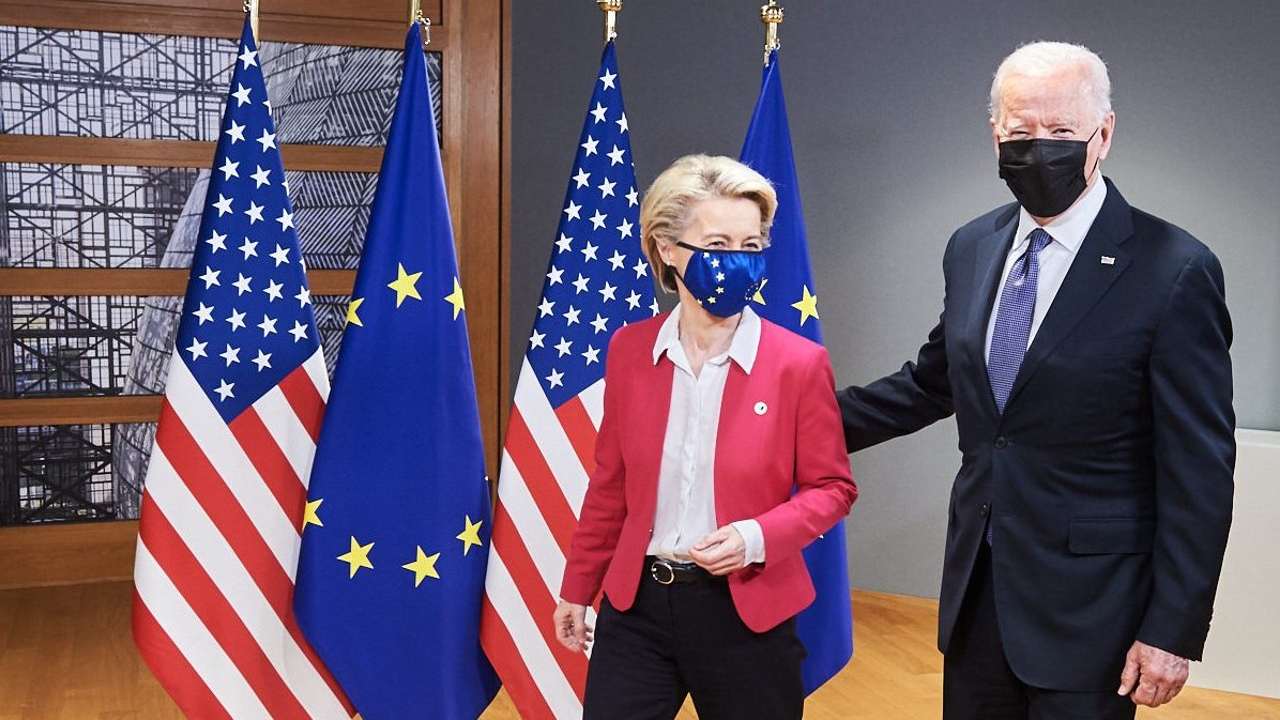The Paris meeting is shaping up as a Putin-bashing love fest. Russia’s invasion of Ukraine has prioritized transatlantic digital unity, catalyzing important advances. After several years of impasse, the US and Europe agreed in March to a new deal securing the transatlantic flow of data. Both signed up in April to a new declaration in support of a “democratic” Internet, fighting Russian disinformation and cyberthreats. Both also are working well to coordinate sweeping technology sanctions, creating an “information sharing mechanism” to check that no one is cheating.
Significant as these achievements are, the two sides disagree on serious issues about regulating the Internet, how to pay for Internet infrastructure, whether to promote data localization, and perhaps most importantly, how much to isolate China. Both European and American officials say these differences will be papered over or not even discussed at the May 15-16 Paris meeting. A near-final upbeat communique emphasizes defending Ukraine and is filled with congratulations about “excellent” cooperation in export controls and sanctions against Russia.
When the Council’s first meeting took place in Pittsburgh last September, the talks already avoided tough issues. “While the focus on ‘low hanging fruit’ is acceptable as a first step, decision-makers should not lose sight of the bigger picture and strategic objectives,” a coalition of 11 trade associations from both sides of the Atlantic warned this month in a public letter. Business and civil society complain about being sidelined by the government-to-government process; the Internet, they say, long has favored multistakeholder governance that includes them.
Europe this year has passed two landmark laws designed to rein in Big Tech. Their targets are disproportionately American companies. Washington’s reaction has been muted. In part, that’s because the Biden Administration shares many European goals on ensuring fair competition in digital markets and in forcing Internet platforms to do more to combat illegal content. In part, too, American officials acknowledge that they can do nothing to stop the new European laws from going into effect. The preliminary TTC communique does not mention the key issue of platform liability.
Yet the challenges behind the Digital Services and Digital Markets Acts should be included, not overlooked. “The two sides could cooperate on risk assessments for platforms, new data access and transparency requirements, and even means of establishing codes of conduct for state-backed disinformation and harmful speech,” writes Tyson Barker, head of the Technology and Global Affairs Program at the German Council on Foreign Relations.
On some other issues, it’s hard to see how Washington will stay silent. Europe’s telecom operators are demanding payments from Big Tech, arguing that Meta, Alphabet, Apple, Amazon, Microsoft, and Netflix accounted for over 56 percent of all global data traffic last year. The argument is old. What’s new is support from European politicians led by Commissioners Magrethe Vestager and Thierry Breton. Although the European telecom operators argue that they are just asking these super consumers to pay a highway toll, the US targets see an unjustified, discriminatory tax.
Internet infrastructure represents another area of discord. The two sides agree in principle to limit Chinese technology – read Huawei – from constructing their next-generation mobile phone networks. Both American and Europeans are poised to promote the use of “trusted vendors” in critical telecom.
Yet in the preliminary Paris communique, neither China nor Huawei are mentioned by name and the two sides disagree about how best to achieve their common goal. The US backs a new telco standard called Open Ran that relies on Japanese and Korean hardware and American chips and software. Europe is skeptical, fearing that its own telephone suppliers Nokia and Ericsson, will be damaged. This week, the European Commission released a new negative report on Open Ran, calling it a security risk.
An additional potential conflict concerns data. The two sides made a big breakthrough when Presidents Joseph Biden and Ursula von der Leyen agreed to a new deal to keep data crossing the Atlantic. Details now need to be filled in and eventually accepted by the European Court of Justice. A solution is possible. But Europe is planning a series of new data acts, some of which could promote data localization and discriminate against American cloud computer leaders, Amazon, Microsoft, and Google.
Despite failing to smooth overall rough waters, US officials are bullish on expanding the Trade and Technology Council’s common front against Russia to include China when officials meet in Washington DC at the end of the year. Deals, they say, could be envisioned on semiconductors and standards. That would represent real progress on top of enthusiastic communiques.
Bill Echikson is the Director of CEPA’s Digital Innovation Initiative and edits Bandwidth.
Bandwidth is CEPA’s online journal dedicated to advancing transatlantic cooperation on tech policy. All opinions are those of the author and do not necessarily represent the position or views of the institutions they represent or the Center for European Policy Analysis.





